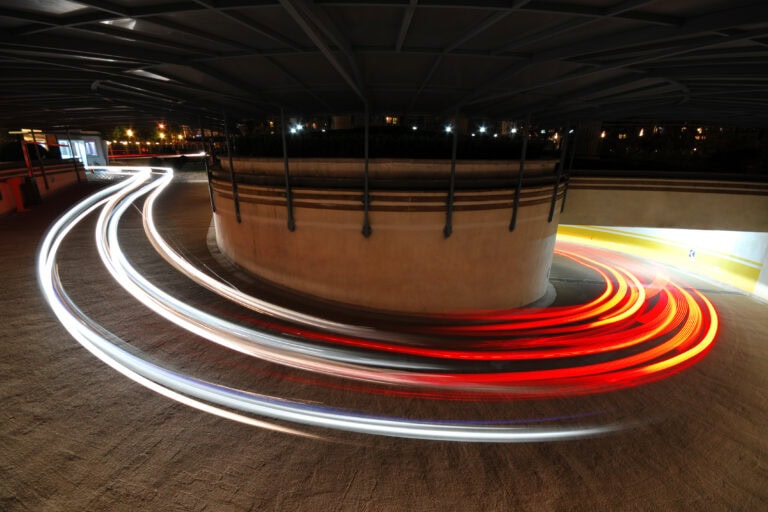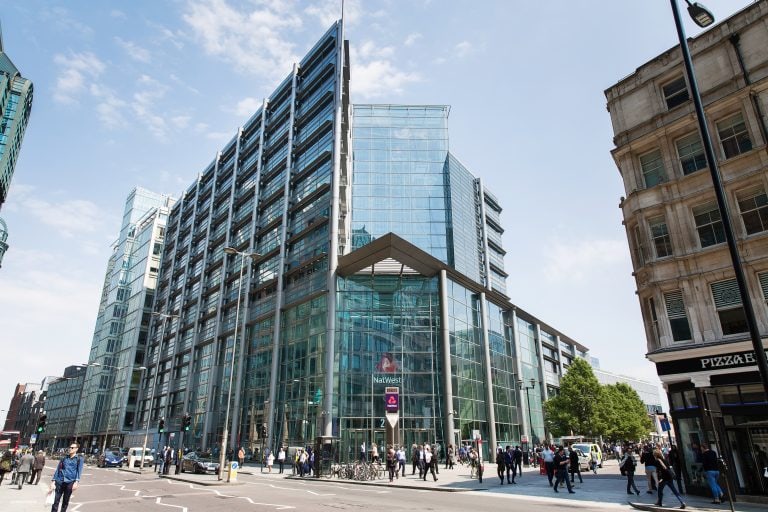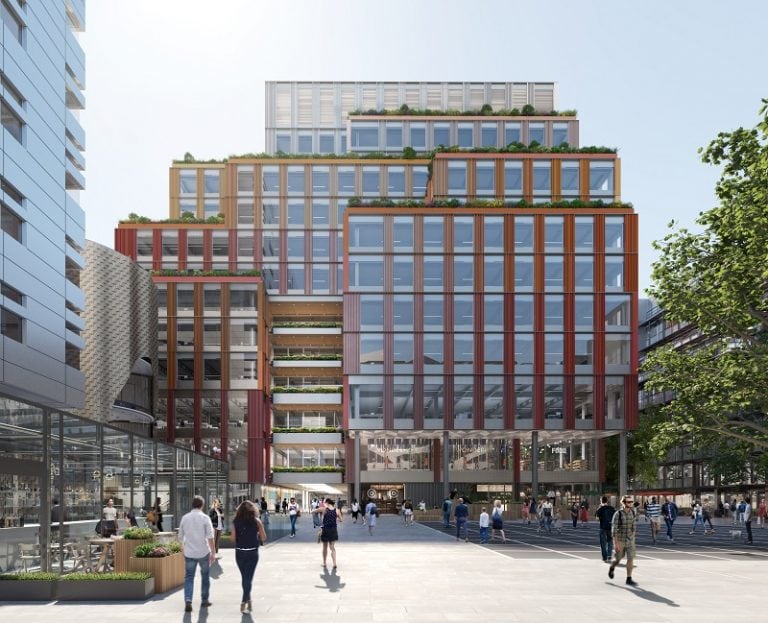Why Race to Zero? Insights from UKGBC Signatories

In May 2021, UKGBC became the first official Accelerator to the Race to Zero, the UN-backed global campaign rallying non-state actors to reduce emissions across all scopes swiftly and fairly in line with science, with transparent action plans, robust near-term and long-term targets, and annual reporting against their progress.
Last year, it was announced at COP26 that the built environment was leading the way in signups to the Race – demonstrating how innovative and forward thinking this industry can be. With the built environment responsible for 20% of the UK’s emissions, it’s key that this leadership continues if we’re to reach crucial climate targets.
On becoming an Accelerator to the Race, UKGBC issued a call to all our members to join the campaign and made this a formal membership requirement for UKGBC Gold Leaf members. Back in April 2021, just 9% of UKGBC business members (28% of Gold Leaf members) had joined the Race to Zero. By April 2022, over 25% of those same business members (and almost 70% of Gold Leaf members) had joined. Looking ahead, we have set ourselves a series of targets to gradually bring more of our business members into the Race, supporting them in doing so through a variety of ways including the launch of UKGBC’s new Collaboration Café events.
This deep dive intends to give prospective Race to Zero signees more insight into why and how joining the Race can benefit your organisation, learning directly from the experience of others.

The Product Manufacturer and Solutions Provider perspective – Schneider Electric
A currently underrepresented segment in the Race to Zero, it’s great to see UKGBC Gold Leaf Member Schneider Electric demonstrating leadership as a manufacturer of electrical products and technologies. But why the Race to Zero?
‘Schneider Electric signed up to the Race To Zero (RTZ) in its early stages at CEO level as the RTZ to shows our global commitment and contribution to a more sustainable world. The RTZ formalises our net zero goals and aligns to a common standard. Aligning to science-based targets ensures our credibility as a leader in sustainability with verified targets. The RTZ shows a collective commitment from business to net zero and allows us to work with likeminded companies and help pull other companies along the journey with us.‘
Product manufacturers often have some of the most complicated supply chains, as challenges pertaining to the end of life of their products. Committing to climate action might therefore seem daunting. However, Schneider Electric believe that making ambitious, science-based commitments is vital:
‘We are working towards a crucial moment in history, we need everybody in and working together from every sector. This is not the time to be cautious, it’s the time to change.‘
Schneider Electric joined the Race by signing up to the Business Ambition for 1.5oC campaign. They have had their near-term and long-term science-based targets validated by the Science Based Targets institute (SBTi) including a net zero target date of 2050 validated against the SBTi’s Net Zero Standard.
The Charity and Social Enterprise perspective – Bioregional
Bioregional has been a member of UKGBC for over 10 years and focuses on making sustainable places with a better way to live. They initiated the UK’s first major sustainable community – BedZed – and provide consultancy services. Sustainability has always been at the core of what they do, so joining the Race to Zero through the SME Climate Hub just made sense:
‘It’s now clearer than ever as we see the impact of our changing climate around the world, that we do not have a habitable planet for nature, for our children and grandchildren, or a functioning economy, without going zero carbon.
And at Bioregional, we know through practical experience that we absolutely can do this. Over the past 25 years, we have worked with partners to create zero carbon homes and helped business and local government to develop new approaches to achieve net zero, and new opportunities as they help their residents and customers to go zero carbon.
It’s a better, zero carbon future, or no future. That’s why we’ve got behind the Race to Zero.’
Overall, Bioregional see the Race to Zero as an opportunity ‘to demonstrate true climate leadership.’ They echo our view at UKGBC when they say, ‘there simply is no time to waste, and getting your organization on a scientifically approved path to net zero is the place to start.’
‘We have all the technologies and approaches we need. Pretty soon it will just be the new normal. When we’ve got a cleaner, healthier, more equitable world, we’ll look back and wonder why we didn’t get on with it sooner.‘
The Engineer perspective – Troup Bywaters + Anders
Troup Bywaters + Anders (TB+A) have offices across the four devolved nations of the UK. As a partnership, they have been climate neutral since September 2020, certified by ClimateCare, and alongside the Race to Zero are committed to their own Sustainability Strategy and Action Plan, covering12 of the UN’s Sustainable Development Goals. But why choose the Race to Zero
Troup Bywaters + Anders, ‘are a signatory to the ‘Race to Zero’ because we are acutely aware of our place in the world and the positive impact we can have through our actions, knowledge sharing and support to our clients, communities, and people. As a socially responsible and ethical partnership, we intend to be instrumental in creating positive social and environmental impact through our activities.‘
They became a member of the Race to Zero through the SBTi, who have verified their 1.5-degree near-term 2030 target. The target was approved using the streamlined target validation route exclusive to small and medium-sized enterprises (SMEs). Ultimately TB+A want to be an organisation that is not just net zero, but also regenerative.
Why should engineers join the Race?
‘The ‘Race to Zero’ is important to us as engineers, as we have the ability to shape the future of the built environment and can see the major changes the industry must go through in terms of approach and alignment with nature in a short time.
We have witnessed the dramatic changes created by humanity’s approach to the natural world and huge impact as a consequence on the climate, biodiversity and vulnerable peoples and societies. Each conversation, collaboration and project represents an opportunity to do something positive to reverse this situation, and one that all within the built environment must commit to achieving.’
In general, the team stress the importance of building ‘new forms of collaboration across the public and private sectors,’ as well as change at a ‘system level.’
‘At TB+A we know that it is daunting to start your journey to net-zero, but all who have signed up to the Race to Zero can assist new signatories in setting goals and strengthening relationships with clients and industry partners in this endeavour.‘
The Environmental Verification Body perspective – Sintali
Sintali are an environmental certification body, verifying the environmental impact of the built environment and helping organisations make net zero a reality. Therefore, they strongly believe that they couldn’t, ‘just promote sustainability solutions externally’ but also had to ensure they had ‘created a sustainable business internally…Becoming a signatory of the Race to Zero campaign was an easy choice, as it clearly aligns with these values and what we’re trying to do.’
Increasingly, there are organisations like Sintali who’s core purpose is to promote and facilitate Climate Action, and it’s crucial that they themselves are actively working towards that goal. The Race to Zero is a brilliant way to showcase that, and ensure their operations line up with their brand goals. That’s why they signed up via the SME Climate Hub.
For Sintali, the Race to Zero has been, ‘a universal platform that can cater to different industry needs and provide the resources and guidance needed to get everyone working towards the same goal.’ Particularly, they reflect; ‘it has been a valuable tool to align our efforts and clearly delineate our path forward to net zero.’
The Property Company perspective – Grosvenor
As a Gold Leaf member of UKGBC and partner of our Advancing Net Zero programme, Grosvenor’s UK property business has made great strides as a signatory of Race to Zero via the Business Ambition for 1.5oC campaign.
They’re committed to slashing emissions from their buildings, developments, and supply chain by 90% across all scopes by 2040 and aim to be climate positive before 2050. By 2022 Grosvenor had achieved a 24% absolute emission reduction against their baseline, and this year they became the first European property company to gain a validated long-term science based net zero target. Supporting this, Grosvenor has committed to being zero waste by 2030, and for the same date they’re committing to an 100% increase in biodiversity on all developments.
Overall, Grosvenor has aligned with all “5 Ps” of the Race to Zero criteria – including the most recent addition, “Persuade”. For example, Grosvenor Property UK’s Executive Director was a COP26 UK Built Environment Climate Ambassador, they offer a free Net Zero Mentoring Programme supporting SME suppliers gaining science-based targets, and are members of a wide range of climate action campaigns, including as founding partners of SteelZero and ConcreteZero. Their work with UKGBC is of course part of this, and in this past year Grosvenor have supported our calls to prioritise retrofit along with other leading businesses.
The Innovative Start Up perspective – BrainBox AI
When it comes to climate action, it’s not just mature businesses that need to be involved – start-ups who are in the earlier stages of their journey still have a key role to play. BrainBox AI are a tech company, originally based in Montreal with a growing presence in the UK. They leverage AI to run HVAC systems within commercial buildings so that they are as energy efficient as possible.
When asked, they simply shared that they’re a member of the Race to Zero because ‘the time to act is now.’ Their corporate vision, ‘is to save the planet with AI, and… know that drastic results require drastic action.’
Being within the technology space, they face different challenges compared to more traditional organisations. They share that as a company that’s ‘experiencing extremely rapid growth, it is easy to get lost in the action of everyday operations and temporarily lose sight of this larger issue. Joining the Race to Zero creates accountability and ensures that our focus does not waver. Though our technology makes a huge difference in decreasing the carbon footprint for our clients, we want to make sure that we are also taking the time to look in the mirror and optimize our own operations for environmental success.’
For BrainBox AI, the fact they’re a start up doesn’t stop them from being committed to climate action; ‘companies big or small can lead by example and joining the Race to Zero is a perfect way to do so.’ In particular they point to the SME Climate Hub as a ‘great initiative’ for those similar to them who want to join the Race. They particularly cite the ‘numerous tools’ they provided them with.
Closing thoughts
These six businesses represent a small fraction of the many UKGBC members who have committed to action by signing up to the Race to Zero – but we hope it provides some insight and inspiration for those who are yet to sign up.
For more information on how you can join Race to Zero, and UKGBC’s role as an Accelerator of the campaign, you can find out more here.
UKGBC’s new Collaboration Café events also offer a space for built environment peer groups within UKGBC’s membership to knowledge-share about the practicalities, implications, and challenges of becoming net zero businesses. Collaboration Cafes are running monthly, open to different sub-sectors of the membership and can be found here.
Related
But how can I join the Race to Zero?

On your marks, get set. Go! Contractors and product manufacturers accelerating the Race to Zero

Banking on net zero buildings

Collaborating on net zero – locating the right office to match your ambition






